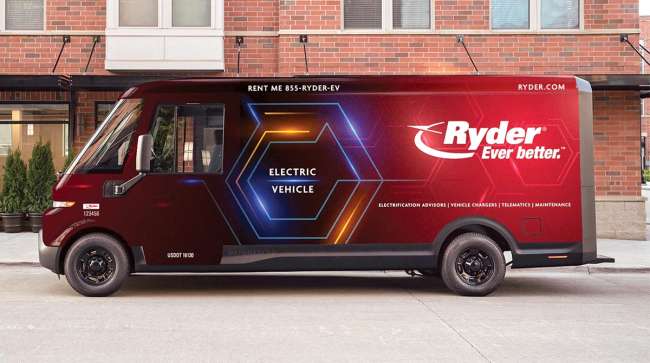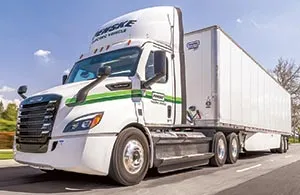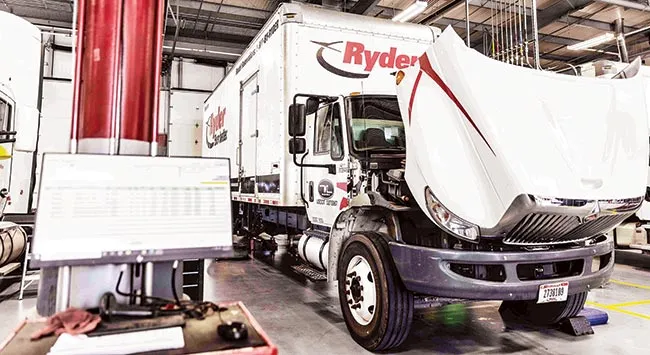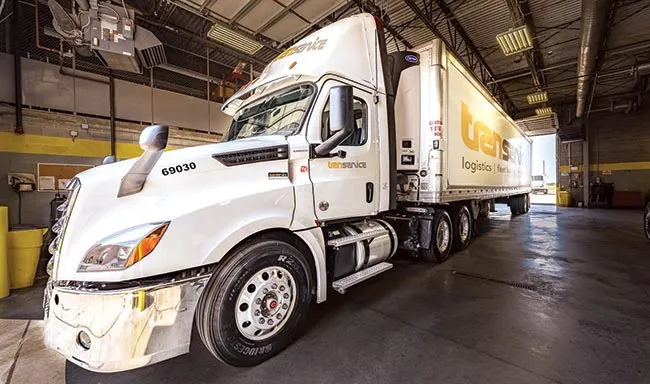Contributing Writer
Leasing Offers Pathway for Fleets Interested in EVs

[Stay on top of transportation news: Get TTNews in your inbox.]
Fleets that want to test the waters with electric vehicles or other types of technology don’t have to do it themselves or even use their own trucks. Leasing companies are providing that opportunity for fleets that desire to enter the EV space.
Jim Lager, executive vice president of sales and rental for Penske Truck Leasing, said leasing arrangements help fleets navigate a challenging environment where emissions rules are changing and the industry is moving toward electric and other alternative vehicles.
Lager said Penske can ensure customers are compliant, help them spec and procure vehicles, and maintain them — even washing the trucks.
“The more complex vehicles become, the more expensive they become, the more uncertainty around them, the more people come looking for help,” Lager said.

Leasing arrangements help fleets navigate a challenging environment with updated emissions rules and the arrival of electric vehicles. (Penske)
Lager said a leasing company can help fleets start to incorporate electric vehicles into their operations, offering consultation on issues such as charging, regulations and grant funding. It also handles the residual risk associated with the equipment itself.
Lager noted that companies like Penske can do this because it already has been working with electric vehicle technology for years. In the technology’s earlier stages of development, it entered into co-creation agreements with manufacturers where it integrated prototypes into real-world applications, and then advised the manufacturers to help them get production vehicles to market. He added that no matter the size of the fleet, it’s not that easy to make this transition.
“There’s a lot of work involved, and it’s stuff that we’re already doing on behalf of our customers,” he said.
Brian Antonellis is senior vice president of fleet operations at Fleet Advantage. The company provides data analytics, equipment financing and life cycle cost management services. He said the trucking industry is undergoing its largest technology and assets change since it moved to selective catalytic reduction and diesel exhaust fluid systems as a result of Environmental Protection Agency emissions mandates in 2007. Since then, technology has been allowed to catch up, but the environment is about to change quickly with emissions reduction and electric vehicle mandates, particularly in California. A leasing partner can help ensure a fleet doesn’t get ahead of itself or be unable to react to changes in the industry.
“Giving those flexibility points throughout your lease with all the technology changes that are coming is going to allow us to have a strategic plan that helps the customer map out the next 10 years,” he added.
Fleet Advantage’s Electric Vehicle Analytic Navigator tool, EVAN, helps customers determine the total cost of ownership related to maintenance, fuel and finances down to the state level, because costs vary.

Ryder is among companies that are adding preventative maintenance packages to assist fleets more efficiently. (Ryder)
Ryder’s Carlo Rodriguez, managing director of electric vehicles, said his company expects fleets to outsource more electric vehicles than they do diesel-powered vehicles. The reasons are due to the challenges associated with electric vehicle acquisition and financing, charging and infrastructure, maintenance and repairs, and on-road usage with telematics and digital technologies.
The company’s RyderElectric+ service provides customers with end-to-end services while providing advisers, vehicles, charging, telematics and maintenance. The company’s telematics data helps fleets determine when electric vehicles should be adopted.
Rodriguez noted that California will be implementing a phased-in approach with electric vehicles required to be a percentage of a fleet. That means a fleet that pre-buys a large number of diesel-powered vehicles will have to buy more electric vehicles once the compliance years begin.
In addition to helping fleets adopt electric vehicles, leasing companies can help them adopt other technologies.

Thompson
Samantha Thompson, vice president of customer success and fleet telematics for Penske Transportation Solutions, said customers have access to all of Penske’s technology. The company will integrate the carrier’s data from its telematics provider into its own system.
Penske can use predictive analytics to determine when a part will fail before it actually does. It can be repaired when the truck is in Penske’s control and when it’s convenient for the customer before a problem occurs.
“We don’t want your vehicles in our shops any more than you do,” she said. “We are very interested and invested in having those vehicles up and moving and in your hands, and a way that we can do that is by being proactive in how we approach maintenance.”
Fleet Advantage offers assistance to fleets, for instance, by helping them determine the best time for them to replace equipment. Using a customer’s maintenance data, it monitors if a truck is running a lot of miles or has high maintenance costs for the area where it’s running. In those cases, the customer can exchange early — or it can exchange for an electric vehicle or other alternative.
“Ownership creates some behaviors that typically drive up costs,” said Hadley Benton, executive vice president of sales for Fleet Advantage. “You fall into that sort of ‘free truck syndrome’ because I own it, it’s not costing me anything and I can run it till the wheels fall off. And we try to help our customers get out of equipment at the right time because a new truck is less expensive to operate.”

Rodriguez
Ryder’s Rodriguez said the Federal Motor Carrier Safety Administration’s ELD mandate “has turned telematics into table stakes for many fleets” — in other words, a minimum requirement.
“But the vendor landscape is highly fragmented, and fleets are not necessarily getting the most value out of telematics to improve operational efficiency, safety or asset utilization,” he said via email.
Rodriguez explained that Ryder’s Connected Fleet group can help fleets select the right telematics solutions along with other technologies like weigh station bypass and driver workflow tools.
“In addition, leasing providers that are industry-leading and/or offer end-to-end solutions understand all regulations with a greater level of detail, can find commonalities across different rules, and therefore reduce the burden/impact of compliance for customers by identifying a handful of actions that can meet the compliance requirements across several rules,” he said.

Transervice Logistics provides full-service leasing, including for Bell Canada's 10,000 vehicles, of which about 600 are electric. (Transervice Logistics)
Transervice Logistics also provides full-service leasing, including maintenance for nonlease customers and dedicated contract carriage. The company serves about 50 customers, including food distributors, hardware distribution companies, compressed natural gas companies and livestock haulers. Its technicians work in its lease customers’ shops or in nearby shops that Transervice leases. Although the company is not leasing any electric vehicles currently, it knows those days are coming soon, said Doug Adamson, senior vice president of sales and marketing for Transervice.

Adamson
The company is getting good experience providing maintenance services for Bell Canada’s 10,000 vehicles, of which about 600 are electric. The keys, he said, are diagnostics and technician training, along with training drivers not to stay on the road until their batteries die.
Adamson noted that leasing offers a number of advantages for fleets. Transervice controls about 25,000 pieces of equipment, and with its affiliation with the NationaLease cooperative, it can leverage its purchasing power for parts, tires and equipment through a consortium that collectively manages more than 700,000 vehicles. While fleets are having trouble obtaining equipment, Transervice has preset slotting with truck manufacturers. Customers have a fixed rate throughout a 3- to 6-year lease, removing the risk of maintenance costs increasing. The company also monitors a customer’s costs and performs life cycle analyses on a per-unit basis.
“When you couple the maintenance along with the actual financing of the equipment, you put all that together, we can do it much cheaper than they can do it themselves,” Adamson said. “Plus, if they were to do it themselves, they would have to go out and hire mechanics and have to buy all the technology for a shop, plus all the tools, all the environmental fees, all those things that we contend with every day.”
Want more news? Listen to today's daily briefing below or go here for more info:




